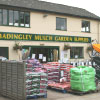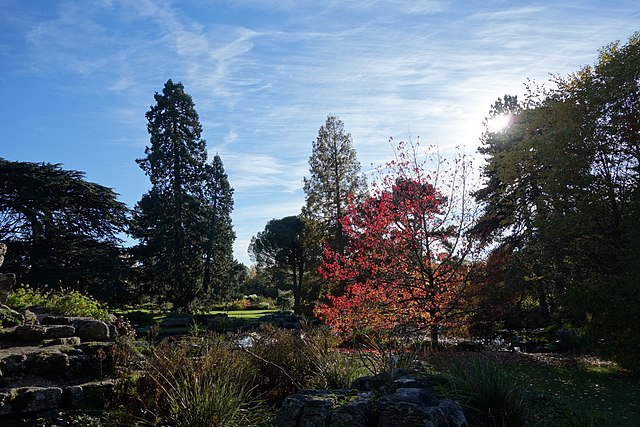Gardens to Visit in and Around Cambridge
If you need any inspiration for your own garden, then why not combine a visit to our base on the outskirts of Cambridge with a visit to the city itself? There are plenty of gardens – some of which are listed below – which are open the public which could provide you with inspiration for your own outdoor space – and then you could come and see us for all your outdoor gardening supplies in Cambridge and the surrounding area.
Christ’s College Gardens
These gardens are located in St Andrew’s Street in the heart of the city. It comprises the First, Second and Third Courts, the Fellows’ Garden and the Darwin Garden (there is a Master’s Garden too, but this isn’t open to the public).
The First Court is notable for its circular lawn, and its enclosed nature which allows the college to grow a variety of shrubs and wisteria. The Second Court has a series of formal lawns accompanied by more informal summer bedding plants; and the Third Court has an extensive collection of irises and salvias.
The Fellows’ Garden has plenty of shrubs, trees and winding paths, as well as a bathing pool near the bottom end, and some beehives (the honey is collected and given to the college Fellows). The Darwin Garden is a recent addition; it was created in 2009 and honours the bicentenary of the birth of explorer Charles Darwin. The garden contains the types of plants he would have encountered on his famous voyages on HMS Beagle.
For details of opening times check the website.
Cambridge University Botanic Gardens
Close to the Cambridge train station, the Botanic Gardens (pictured at the top of this article) span 40 acres and include more than 8,000 varieties of plants, split into various themed gardens. These include dry gardens (and meadows), rock gardens, areas devoted to specific types of flowers (such as snowdrops and roses) and some spectacular Giant Redwood trees.
There’s plenty to keep children interested as well – not just the focal points such as the lake and the fountain, but the schools’ garden and the grass maze. Provided they are under 16, entry is free (although there is a charge for adults).
Opening times vary depending on the season; check the website before you go. There are also a number of special events run throughout the year which may be of interest as well.
Trinity Hall Gardens
This garden is split into two separate sites. The Central entrance includes the Front Court, Latham Court, North Court, Avery Court and the Fellows’ Garden. The Front Court has plenty of irises, roses, lavender, fuchsias and trailing plants, while Latham Court (the next area you come to) is dominated by magnolias and beech and yew trees.
Avery Court has plenty of trailers and shrubs alongside ferns, hellebores agapanthus and wisteria North Court is the smallest of the gardens, and it includes hornbeams and pyracantha. The Fellows’ Garden contains shrubs, herbaceous plants, roses, trees and bulbs.
Trinity Hall’s Wychfield site (which includes Greenhouse Court, Round Court and Green Lane) incorporates a couple of special features alongside a rich variety of plants. The sunken garden mixes hedges and herbaceous borders, while there are a number of mature trees dotted around the gardens.
Check the website for opening times.
Newnham College Gardens
These gardens are just a 10-minute walk from the city centre; its grounds are often called the Secret Gardens of Cambridge. The gardens are set in 17 acres and broken up into large lawns and wildflower areas, as well as herbaceous borders and formal gardens.
As with Trinity Hall, there is also a sunken garden – although this specialises in roses and has a formal pool, which is dedicated to the co-founder Henry Sidgwick. You should check the website for opening times.
Madingley Hall Gardens
This seven-acre garden is just under a mile away from our base. Although the Hall was built in the mid-16th century, the first evidence of an accompanying garden only comes two centuries later. The famed landscape designer Capability Brown was responsible for the initial informal style (with plenty of grasses and trees dotted about). Subsequent changes (notably by the University in the mid-20th century) have seen the addition of alpines, climbing plants, shrubs and perennials which thrive in the Hall’s warm micro-climate and dry growing conditions.
In 1983 a new area was added behind the Hazel Walk, which includes a herb and medicinal garden and a white garden. Check the website for opening times.
Outdoor Gardening Supplies in Cambridge from Madingley Mulch
If you want to recreate some of the ideas in any of these gardens, then Madingley Mulch is the place to come to. Our range of soil improvers – which we can deliver to Suffolk, Essex, Hertfordshire and Bedfordshire as Cambridgeshire – means you may be able to grow some of the plants on show in any of the above gardens, even if your soil and micro-climate is different. These include Denise’s Delight and Tony’s Tonic, products which are exclusive to Madingley Mulch.
You can also check out our online shop here or just call us on 01954 212144.
Image: WIKIMEDIA COMMONS
Back to blog




